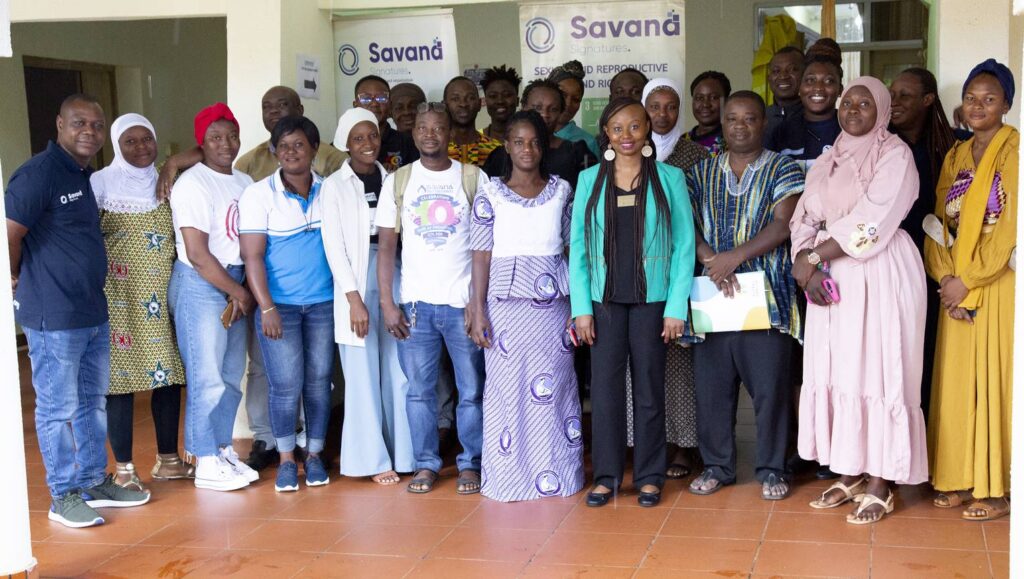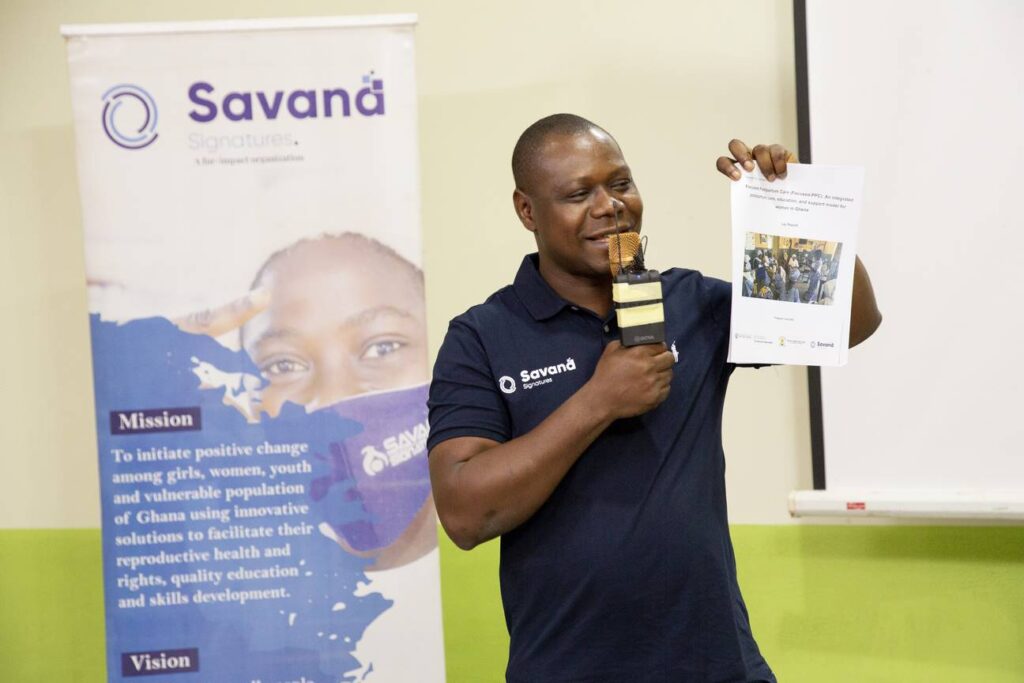FROM LEARNING GAPS TO LEARNING GAINS: RURAL GHANA’S QUIET EDUCATION...
Read MoreOne-year postpartum care trial shows positive maternal health outcomes

Findings from a clinical trial have revealed that mothers who received continuous standardised postpartum education and care for one-year experienced significant improvements in their knowledge of self-care and healthy behaviours.
These improvements led to enhanced maternal health outcomes, marking a crucial step forward in addressing postpartum complications.
While the World Health Organization (WHO) recommends postpartum care from one hour after delivery to six weeks, recent data has highlighted a concerning trend of postpartum complications and mortality occurring beyond this period.
“As we continue to work in this area and data is coming out, we now know that a lot more women are dying beyond the six-week period,” Principal Investigator for the Focused Postpartum Care trial, Dr Joyce Yenupini Adams noted.
Sharing findings from the randomised clinical trial with the Ghana Health Service in Tamale on Wednesday, Dr. Yenupini observed that postpartum care beyond six months was “very important” if Ghana wants to improve on its maternal health outcomes.
“This late postpartum period is very important because mortality isn’t just occurring within the six weeks, it’s continuing up to one year from causes related to pregnancy and childbirth,” she said.

She indicated women undergo significant life and mental adjustments during the postpartum period, highlighting the necessity of extended care beyond the traditional six-week timeframe.
“Quality postpartum care is critical so that women and healthcare workers are able to identify and manage complications…postpartum education is also important so that women are empowered to be able to seek care in timely manner and these are the reasons why we developed the Focused Postpartum Care project” she explained.
The Focused Postpartum Care is a model which was developed in 2020 by Savana Signatures and the ECKS Institute for Global Health through an extensive consultation with the Ghana Health Service and key stakeholders.
The project utilised a randomised control trial model in four facilities – Choggu, Kalpohin, Gabagaba and Kanvaili – within the Sagnarigu municipality and provided standardised postpartum care to mothers from birth through six weeks up to one year. This care included clinical assessment, postpartum education, and peer support.
The women were recruited during the third trimester of their pregnancy and waited for them to deliver. On the back of a baseline survey, they were randomised into an intervention and control groups.
“This was not selective; this was not biased. Whoever went to the intervention versus control group was by random selection, so that we can actually be able to say the results that we are seeing is due to the intervention and not due to biases,” Dr Yenupini explained.
Women in the intervention group received the focused postpartum care model whereas those in the control group received the usual care or the standard postnatal care already existent in the health facilities.
At each Focused Postpartum Care, participants in the intervention group were individually assessed clinically and counselled after which they met for a group session with the midwives for the postpartum education.
“We ensured that women received the recommended clinical assessment within two weeks, at six weeks and continued to receive measures of vital signs up until 12 months after birth,” Dr Yenupini who is an Assistant Professor at the ECKS Institute said.
Focused-PPC Impact
She explained that the primary outcome of the Focused Postpartum Care project was the knowledge level of the women in identifying post birth warning signs. The results showed a significant difference between the intervention and control groups in terms of their ability to identify warning signs of complications.
Over time, the identification and knowledge of warning signs decreased in the control group, while they increased in the intervention group. By three months, almost 100% of the mothers in the intervention group were able to identify all warning signs, compared to only 30-41% in the control group.
Furthermore, the project positively impacted women’s confidence in recognising complications. Confidence level increased in the intervention group for every complication, while it decreased in the control group. Notably, the project also achieved success in promoting family planning, with a higher uptake of family planning methods in the intervention group compared to the control group.
The clinical assessments conducted during the postpartum period also proved essential in identifying issues such as high blood pressure, even beyond six weeks.
Dr. Yenupini stressed the importance of continuing postpartum care beyond this period to effectively manage such cases. She highlighted that if postpartum care stopped at six weeks, a significant number of high blood pressure cases would go unnoticed, posing potential risks to women’s health.
“The significance that I want to show here is that at six weeks, we had still about half of participants having high blood pressure. If postpartum care stops at six weeks, we are missing out on managing all of these high blood pressure cases and we don’t know what the outcomes will be for women if we don’t continue to provide care,” she stated.
The findings also addressed postpartum depression, showing lower stress levels over time in the intervention group compared to the control group. By three months, there was a significant difference in stress levels between the two groups, which persisted at six months. Similarly, the intervention group had significantly lower rates of screening positive for depression compared to the control group.
The findings emphasise the significance of frequent postpartum care contacts for the identification and management of potential complications. Standardised postpartum education has also demonstrated its ability to improve knowledge of warning signs and promote positive health behaviours.
Based on these findings, Dr. Yenupini has called for the strengthening of midwifery education and training in Ghana, making postpartum care a critical component of the curriculum.
Additionally, she highlighted the need to expand accessibility to postpartum care visits, extending them to one year after birth, as a crucial step in improving health outcomes for women during the postpartum period.

Policy brief
Executive Director for Savana Signatures who was also the co-investigator for the Focused Postpartum Care, Stephen Agbenyo, said the findings set the tone for conversation around postpartum care in Ghana.
He indicated that postpartum training for midwives was very critical, adding the “question is whether we have a postpartum care delivery training guide at the midwifery training schools“.
Mr. Agbenyo wondered whether the various health directorates are adequately resourced to ensure midwives receive either training or refresher courses while on the job. He underscored the need for the eight midwives who benefited from the project to have cascading trainings for their colleagues.
Widespread implementation of one-year postpartum care regimen in the country would require government policy, something Savana Signatures has promised to pursue and push for.
Mr Agbenyo assured that Savana Signatures will leverage the results of the two-year trial to advocate for the implementation of a policy mandating standardised focused postpartum care across all healthcare facilities in the country.
“We’ll translate all the learnings into a policy brief which we’ll share with the Ghana Health Service and other higher authorities and to see how this can be crystalised into something bigger than just the four facilities that we worked with,” he said.
Related Stories
The Effects of the US Foreign Aid Suspension on Northern Ghana
In Northern Ghana, where development challenges are more pronounced due...
Read MoreFighting malnutrition; Savana Signatures embarks on cooking demonstrations in Karaga and Sagnarigu to Boost Nutrition Awareness in the Northern region
This initiative, funded by the World Food Programme (WFP) and...
Read MoreSavana Signatures Honored as Best Innovative Leadership in Social Change Organization at 2024 Ghana Philanthropy Awards
The award was presented to Savana Signatures by His Excellency...
Read MoreSavana Signatures, GHS promote uptake of local nutritious foods in Karaga
Our team on June 3 conducted an educational session at...
Read MoreYikpabongo CHPS: A Beacon of Community Healthcare Transformation in North East
Yikpabongo CHPS in the Mamprugu Moagduri District in North East...
Read MoreSavana Signatures Unites Grassroots Women for International Women’s Day Celebration.
The forum was aimed at inspiring and empowering women to...
Read MoreFirst cohort of Educational Exchange Programme Ends Successfully
The ALASCA delegation received a rousing welcome when they arrived...
Read More







